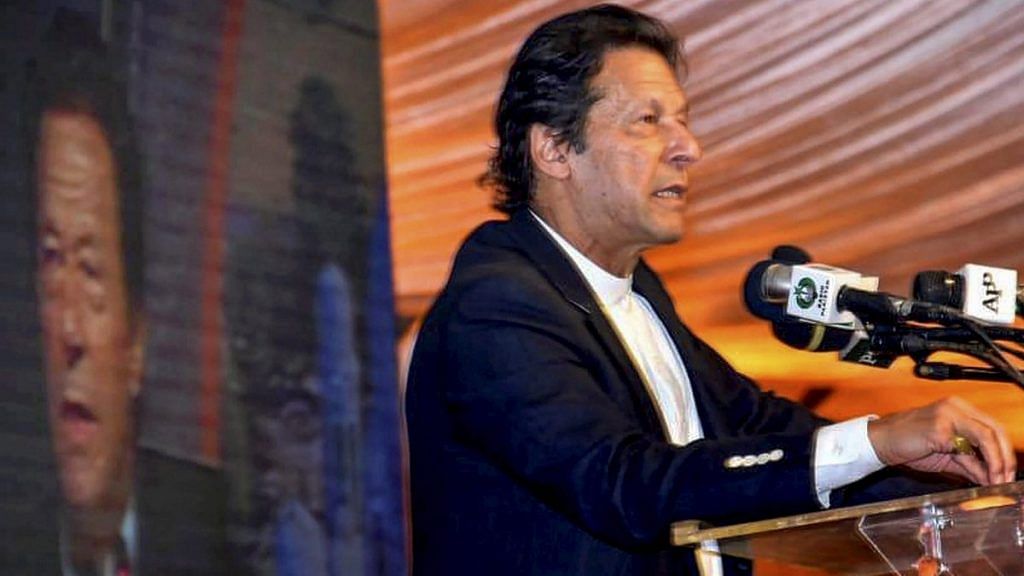At interaction with Indian journalists, Pakistan PM Imran Khan says it’s not in his country’s interest to have its territory used for terrorism.
Islamabad: Pakistan Prime Minister Imran Khan invoked the past to explain the present, saying he had inherited the problem of those accused in the Mumbai attacks.
“It is not in Pakistan’s interest to have our territory used for terrorism outside,” Khan told visiting Indian journalists, pointing out again and again during the half-an-hour interaction that it was important “not to live in the past, but to learn from it. Otherwise we can be trapped by it”.
In the conversation with the journalists a day after the foundation stone-laying ceremony on the Kartarpur sahib corridor, Khan – the man India knows as friendly and charming – seemed restrained and careful in his replies to several questions on Mumbai masterminds like Hafiz Saeed and Zaki ur-Rehman Lakhvi as well as Dawood Ibrahim, said to be hiding in Pakistan since he fled after the Mumbai 1993 attacks.
Asked specifically about the status of Saeed, Khan said there are UN sanctions under Article 1267 on him. “There is already a clampdown. Rest we have inherited,” he said.
“On the one hand we have this case (on Hafiz Saeed) and the other is sub-judice,” Khan said.
Asked why he had raised the Kashmir issue at the Kartarpur Sahib foundation stone-laying ceremony Wednesday, the Pakistan prime minister defended himself by saying, “We are a political government. We make these one-sided gestures (to India) but then we see reports in the media on the situation in Kashmir. In Parliament we have to answer questions.”
When he visited India in 2015, Khan said, former prime minister Manmohan Singh had himself admitted that the Kashmir dispute was holding both India and Pakistan back and deterring progress.
“If we can resolve the Kashmir dispute, we can do anything. Unfortunately, whenever we try and do something, something associated with Kashmir happens,” he added.
The Pakistan PM refused to answer any questions put to him by ThePrint on whether “as a political leader” he could learn from history and whether he had a comment on why Mumbai masterminds like Lakhvi continued to roam free in Pakistan.
“Let us at least sit across a table and talk about all issues. I believe a solution will come when there is dialogue,” he said.
Also read: Don’t get breathless over Kartarpur, Imran Khan has no power to wage war or peace
‘Tried to reach out to India’
But as the questions on cross-border terrorism continued to rain thick and fast, Khan said he had tried to reach out to India from the very first day since he got elected.
“But I got such a bad response from India when the meeting (between the two foreign ministers on the margins of the UN) was cancelled. Then they even put condition for talks…as if there was no intention for peace.
“I was surprised,” Khan said, adding, “and then the election fever started.”
Asked if he would make a grand gesture towards India, because the opening up of Kartarpur Sahib could be constituted as “low-hanging fruit”, Khan said Pakistan also needed a response to several gestures it had made.
“It is okay till the elections, but then we expect the Indian government to respond,” the Pakistan prime minister said.
He repeated his Kartarpur aphorism, “All the authorities in Pakistan, the army, the government, are all on the same page.”
The entire region is looking for peace, the Pakistan prime minister said, and it was the responsibility of governments to deliver. Cross-border trade and other pro-people measures would improve the economy and reduce poverty, he said.
He pointed out that India and Pakistan had changed from the time he used to play cricket against India, “when there was no option to lose”. But then during the Musharraf era, the two countries played against each other and he realised that there was such a desire for peace that the outcome of the match didn’t matter that much.
But, he added, “please don’t confuse these gestures as a desperation for peace.”
Also read: Imran Khan says Pakistan govt and military are on same page, want to mend ties with India
